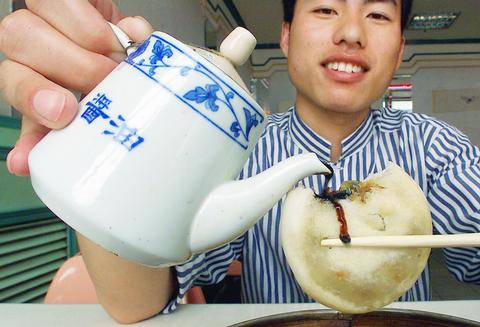Australia and New Zealand yesterday joined Britain in warning against consuming soy sauce following a survey which found some may contain cancer-causing chemicals.
"The Australia New Zealand Food Authority (ANZFA) [yesterday] advised consumers that certain soy and oyster sauces have been found to contain high levels of potentially cancer-causing agents," the joint authority said in a statement.

PHOTO: REUTERS
The warning followed one the day before issued by Britain's Food Standards Agency, which has found that certain brands of soy sauce imported from Thailand, China, Hong Kong and Taiwan contain 3-MCPD, a chemical that can cause cancer if taken daily.
Some also contained 1,3-DCP, which experts advise should not be present at any level in food.
But soy sauce makers in Taiwan said yesterday they had improved quality to meet international standards.
"We have revised the production process since last March to make products qualify under international standards," said an official with Wan Jia Shian Brewery Co (
ANZFA emphasized only one manufacturing process, which uses acid hydrolysis, might cause the chemical contamination, stressing that soy sauces manufactured using a natural fermentation process were regarded as safe.
British health officers began removing 22 soy sauce or soy-based products across the country on Thursday after a warning from the Food Standards Agency that they contained levels of 3-MCPD above safety guidelines.
The Wan Jia Shian Brewery official said their soy sauce products currently contain less than 0.01 parts per million of 3-MCPD which meets the most stringent standards applied by European countries.
Another Taiwan soy sauce maker, Kimlan Foods Co (金蘭), said the samples tested by the FSA could have come from its China plant, where their products had traceable levels of 3-MCPD, but they had stopped such production there. The company said it is shifting focus to production of fermented soy sauce which is free of any 3-MCPD.
Taiwan's Department of Health said it planned to require soy sauce makers to keep 3-MCPD levels below 0.1ppm from July 2002. Products failing to meet the standard would be removed from shelves.
"We have advised local soy sauce makers to gradually reduce the levels of 3-MCPD. We will be moving to internationally accepted standards," said Chen Shu-kong, director of bureau of food sanitation under the health department.
Chinese soy sauce makers protested and threatened legal action yesterday while the Thai government said it was still studying whether incoming EU regulations on acceptable levels of the chemical amounted to an unfair trade barrier.

DEMOGRAPHICS: Robotics is the most promising answer to looming labor woes, the long-term care system and national contingency response, an official said Taiwan is to launch a five-year plan to boost the robotics industry in a bid to address labor shortages stemming from a declining and aging population, the Executive Yuan said yesterday. The government approved the initiative, dubbed the Smart Robotics Industry Promotion Plan, via executive order, senior officials told a post-Cabinet meeting news conference in Taipei. Taiwan’s population decline would strain the economy and the nation’s ability to care for vulnerable and elderly people, said Peter Hong (洪樂文), who heads the National Science and Technology Council’s (NSTC) Department of Engineering and Technologies. Projections show that the proportion of Taiwanese 65 or older would

Nvidia Corp yesterday unveiled its new high-speed interconnect technology, NVLink Fusion, with Taiwanese application-specific IC (ASIC) designers Alchip Technologies Ltd (世芯) and MediaTek Inc (聯發科) among the first to adopt the technology to help build semi-custom artificial intelligence (AI) infrastructure for hyperscalers. Nvidia has opened its technology to outside users, as hyperscalers and cloud service providers are building their own cost-effective AI chips, or accelerators, used in AI servers by leveraging ASIC firms’ designing capabilities to reduce their dependence on Nvidia. Previously, NVLink technology was only available for Nvidia’s own AI platform. “NVLink Fusion opens Nvidia’s AI platform and rich ecosystem for

Taiwan Semiconductor Manufacturing Co (TSMC, 台積電) yesterday said it is building nine new advanced wafer manufacturing and packaging factories this year, accelerating its expansion amid strong demand for high-performance computing (HPC) and artificial intelligence (AI) applications. The chipmaker built on average five factories per year from 2021 to last year and three from 2017 to 2020, TSMC vice president of advanced technology and mask engineering T.S. Chang (張宗生) said at the company’s annual technology symposium in Hsinchu City. “We are quickening our pace even faster in 2025. We plan to build nine new factories, including eight wafer fabrication plants and one advanced

‘WORLD’S LOSS’: Taiwan’s exclusion robs the world of the benefits it could get from one of the foremost practitioners of disease prevention and public health, Minister Chiu said Taiwan should be allowed to join the World Health Assembly (WHA) as an irreplaceable contributor to global health and disease prevention efforts, Minister of Foreign Affairs Lin Chia-lung (林佳龍) said yesterday. He made the comment at a news conference in Taipei, hours before a Taiwanese delegation was to depart for Geneva, Switzerland, seeking to meet with foreign representatives for a bilateral meeting on the sidelines of the WHA, the WHO’s annual decisionmaking meeting, which would be held from Monday next week to May 27. As of yesterday, Taiwan had yet to receive an invitation. Taiwan has much to offer to the international community’s